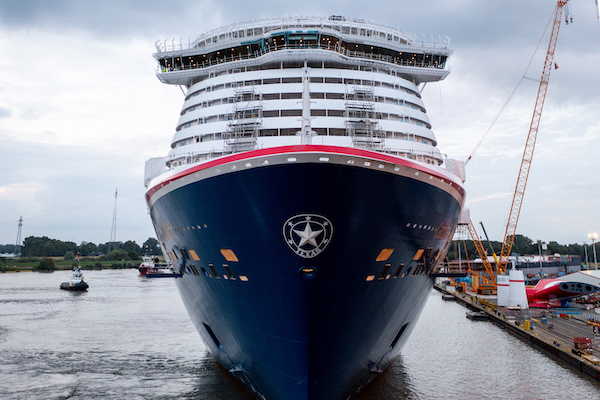Carnival Corporation is making a significant addition to its fleet. The company has announced the order of three new ships designed to enhance the Carnival Cruise Line brand.
These vessels will be powered by liquefied natural gas (LNG) and are set for delivery in 2029, 2031, and 2033. With capacities to carry nearly 8,000 passengers, these will be the largest in Carnival’s global fleet.
Unprecedented Fleet Expansion
Carnival Corporation is embarking on an ambitious expansion of its cruise line fleet. The order for three new ships signifies a strategic move to reinforce its market position in the cruise industry. These ships, once completed, will represent a new class of vessel that prioritises both environmental sustainability and passenger capacity, capable of holding over 3,000 cabins each.
The company is clearly committed to expanding its offerings, as evidenced by the recent newbuild orders made earlier this year. These include two additional Excel-class ships, marking the first new orders in five years. The consistency of these orders underscores Carnival’s strategy of sustained growth over the next decade.
Strategic Partnerships and Innovation
The ships will be constructed by the renowned Italian shipbuilder, Fincantieri. This partnership highlights Carnival Corporation’s focus on leveraging expertise and innovation from industry leaders. The vessels will be powered by LNG, reflecting a shift towards more environmentally friendly fuel options.
Josh Weinstein, the CEO of Carnival Corporation, commented on this development, stating, “We are doubling down on the growth of Carnival Cruise Line to keep up with the incredibly strong demand.” This aligns with their approach of directing new capacity to areas of highest demand.
President of Carnival Cruise Line, Christine Duffy, expressed excitement about the new ships, emphasising that they are focusing on creating unique guest experiences. “For this next-generation ship, we are focused on creating innovative guest experiences,” she stated, which is expected to attract a broader demographic while enhancing overall passenger satisfaction.
Timeline for Delivery and Capacity Increase
The new ships are scheduled for delivery over a period extending to 2033. The strategic delivery timeline allows Carnival Corporation to systematically integrate these new vessels into their cruise offerings without overwhelming existing operations.
The delivery schedule follows a clear pattern, with ships joining the fleet in 2025, 2027, 2028, 2029, 2031, and 2033. This phased approach ensures manageable growth and allows the company to remain adaptive to market demands and potential operational challenges.
Upon completion, the Carnival fleet will include 16 LNG-powered ships, signifying nearly 30% of the corporation’s overall maritime capacity. This commitment to LNG reflects a broader industry trend toward sustainable energy use in maritime operations, aligning with global initiatives to reduce carbon footprints.
Corporate Strategy and Market Demand
Carnival Corporation’s decision to expand its fleet reflects a strategic response to market demand and growth opportunities. The cruise line brand remains a high-return sector for the corporation, as highlighted by the continuous investment in newbuilds over the past year.
Josh Weinstein elaborated on the corporation’s vision, noting, “Our newbuild pipeline is progressing with a disciplined approach to growth.” This articulates a clear strategy to support long-term success and sustainability, leveraging high-demand periods to maximise returns.
The introduction of these new ships will support an average annual capacity growth of approximately 1.5% between 2025 and 2033. This measured expansion aligns with the corporation’s focus on maintaining a competitive edge while ensuring quality service and customer satisfaction.
Environmental and Economic Implications
The adoption of LNG as a primary fuel source for Carnival’s new vessels demonstrates a commitment to reducing environmental impact. This transition not only benefits the environment but also meets increasing consumer demand for sustainable travel options.
The decision ties into broader economic trends where sustainable practices are becoming a competitive advantage in the travel industry. Carnival’s initiative is aligned with similar movements across the sector toward eco-friendly travel solutions.
Pierroberto Folgiero, CEO of Fincantieri, expressed his enthusiasm for the project, noting the significance of these ships as the largest ever constructed by the shipbuilder. This achievement underscores Italy’s role in advancing maritime engineering and bolsters its reputation in ship construction.
Future-Proofing Carnival Cruise Line
Carnival Corporation’s investments in new ship builds and sustainable technology highlight their commitment to future-proofing the fleet. By integrating cutting-edge technologies, the brand aims to enhance passenger experience while adhering to environmental standards.
Christine Duffy remarked on this commitment, “We are focused on innovative features that we know our guests will love.” This focus on future trends ensures that Carnival remains at the forefront of the industry, adapting to technological advancements and evolving customer preferences.
By 2033, the enhanced fleet will allow Carnival Cruise Line to offer unparalleled cruise experiences, ensuring they remain a top choice in the competitive cruise industry.
Conclusion of Expansion Plans
The announcement of these new ships marks a significant milestone in Carnival Corporation’s growth strategy, as it strives to combine increased capacity with sustainable operations.
These efforts will position Carnival Cruise Line to meet rising demand, enhance customer experiences, and maintain leadership in the cruise market.
Carnival Corporation’s strategic fleet expansion, underpinned by LNG technology and innovative guest experiences, reflects a forward-thinking approach. This development not only promises to enhance capacity but also underscores Carnival’s commitment to sustainability and market leadership. As these ships begin their journeys, passengers can expect unique and memorable experiences.

